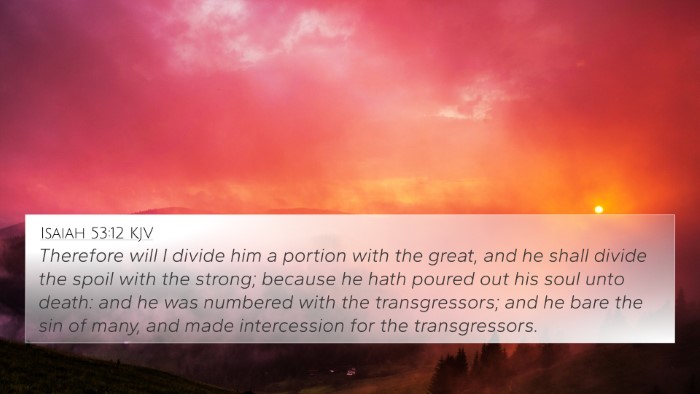Understanding Acts 8:33
Verse Text: "In his humiliation his judgment was taken away: and who shall declare his generation? for his life is taken from the earth."
Acts 8:33 presents profound theological insights about the suffering and humiliation of Christ. Below is a comprehensive interpretation combining insights from esteemed public domain commentaries.
Verse Meaning Overview
This verse reflects the isolation and injustice faced by Jesus during His trial and crucifixion. It emphasizes the humility of Christ and the lack of recognition of His rightful lineage and impact, posing a series of rhetorical questions that draw the reader's attention to the gravity of His situation.
Commentary Insights
- Matthew Henry: He highlights the depth of Christ’s suffering and notes that His humiliation calls attention to how Christ unjustly bore the sins of many, offering His life as a sacrifice. Henry emphasizes that Jesus' generation, or the understanding of His lineage, was overshadowed by His suffering.
- Albert Barnes: Barnes comments on the phrase "his judgment was taken away," pointing out the travesty of justice that Jesus endured. He explains that this reflects the prophecies of the Old Testament concerning the Messiah, signifying the complete misunderstanding and rejection of Jesus' identity.
- Adam Clarke: Clarke provides insights into the implications of "who shall declare his generation?" suggesting that the consequences of Christ’s humiliation affect the understanding of His divine lineage and purpose. Clarke argues that this verse conceals Christ's glory amidst His suffering.
Thematic Connections
This verse lends itself to cross-referencing with several important Biblical themes, illustrating the interconnectedness of scripture.
- Isaiah 53:8: "He was taken from prison and from judgment: and who shall declare his generation?" - This Old Testament prophecy closely parallels Acts 8:33, reaffirming the theme of Christ’s unjust suffering.
- Matthew 27:12-14: The trial of Jesus illustrates the fulfillment of the prophecy regarding His judgment and humiliation.
- John 1:10-11: "He came unto his own, and his own received him not." This further underscores the rejection faced by Christ, paralleling the theme of humiliation.
- Philippians 2:7-8: "But made himself of no reputation, and took upon him the form of a servant..." This passage elaborates on Christ's humility and connects to His earthly experience shared in Acts 8:33.
- Hebrews 12:2: "Looking unto Jesus the author and finisher of our faith; who for the joy that was set before him endured the cross..." This reinforces the theme of enduring humiliation for a greater purpose.
- 1 Peter 2:23: "Who, when he was reviled, reviled not again; when he suffered, he threatened not..." - This verse provides context to the response of Christ during His trial, highlighting His humility.
- Revelation 5:6: "And I beheld, and, lo, in the midst of the throne and of the four beasts, and in the midst of the elders, stood a Lamb as it had been slain..." Here the Lamb symbolizes Christ's ultimate sacrifice despite His suffering.
Cross-Referencing Themes
In studying Acts 8:33, the following keywords are crucial for a deeper understanding:
- Inter-Biblical Dialogue: This verse engages in a conversation with Old Testament prophecies, particularly from Isaiah, about Christ’s suffering.
- Bible Concordance Tools: Utilizing concordances can aid in tracing the themes of humiliation and suffering throughout the Bible.
- Cross-Reference Bible Study: Engaging with this verse encourages believers to explore how different scriptures inform one another about Jesus' character and mission.
Practical Application
Understanding Acts 8:33 is essential to grasp the broader message of the Gospel. It provides an opportunity for personal reflection on themes of humility, sacrifice, and divine purpose amidst suffering. Here are a few study approaches:
- Bible Cross-Reference Guide: Utilize tools and resources to create a detailed map of the thematic parallels in scripture, connecting Acts 8:33 with related texts.
- Identifying Connections: Look at how the New Testament writers use Old Testament prophecies to validate Christ's role as the Messiah.
- Cross-Referencing Bible Study Methods: Employ different methods of study such as thematic studies, which can enhance understanding of how scripture communicates cohesively across both Testaments.
Conclusion
Acts 8:33 is a pivotal verse reflecting the themes of suffering, humility, and the prophetic nature of Christ's life and mission. By engaging with this verse and its connections through cross-referencing, believers can gain a richer understanding of the interconnected tapestry of scripture and deepen their faith in the person of Jesus Christ.

















